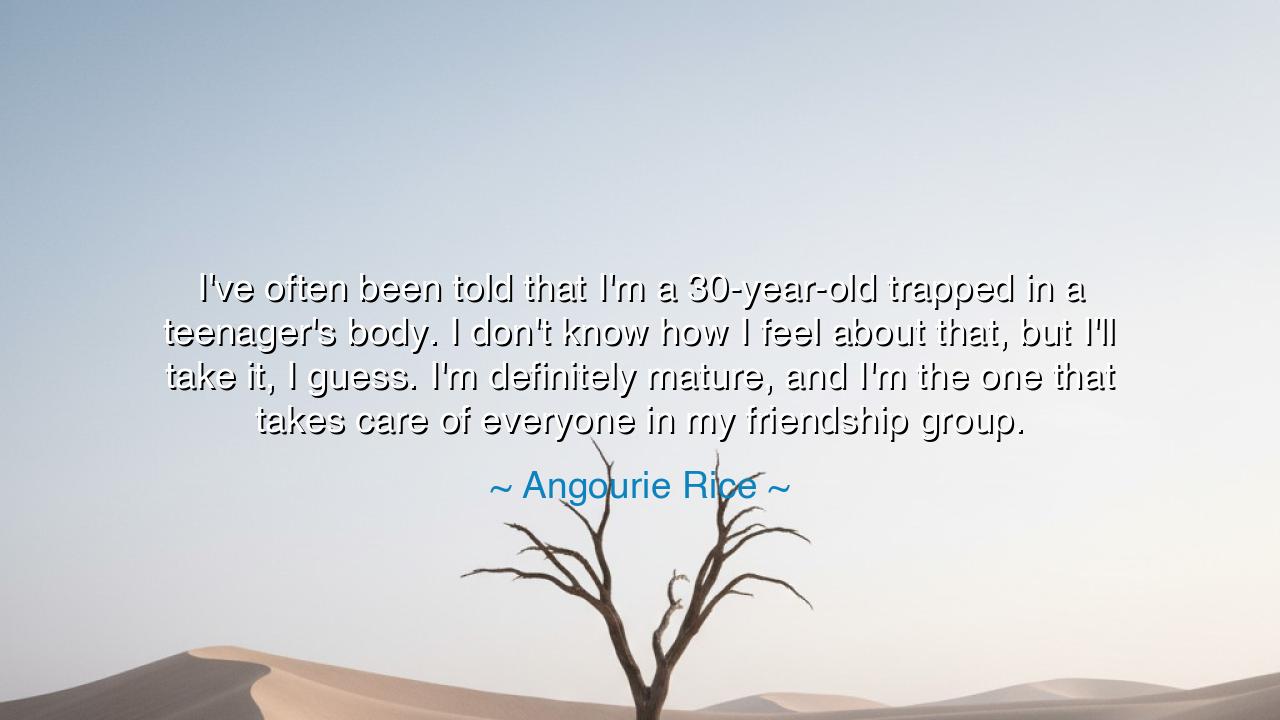
I've often been told that I'm a 30-year-old trapped in a
I've often been told that I'm a 30-year-old trapped in a teenager's body. I don't know how I feel about that, but I'll take it, I guess. I'm definitely mature, and I'm the one that takes care of everyone in my friendship group.






The Australian actress Angourie Rice, known for her poise beyond her years, once said: “I've often been told that I'm a 30-year-old trapped in a teenager's body. I don't know how I feel about that, but I'll take it, I guess. I'm definitely mature, and I'm the one that takes care of everyone in my friendship group.” Beneath these gentle and humorous words lies a deep reflection on the burden and beauty of early maturity, of the soul that awakens before its time. In her confession, there is both pride and weariness—the pride of being wise in youth, and the quiet longing of one who shoulders responsibility before the world expects it. Her words echo a truth as old as humanity: that some spirits are born old, carrying within them the weight of understanding long before the years have caught up.
The meaning of this quote reveals itself through the subtle tension between self-awareness and self-acceptance. Rice speaks as one who recognizes that being “the mature one” among her friends brings both honor and isolation. To be mature is to see farther, to feel more deeply, to understand the fragility of others—and thus, to bear their troubles. It is to be the caretaker, the guardian, even when one longs to be carefree. Yet, maturity in youth is not merely a gift; it is also a cross. For such people often find themselves watching over others while wondering who will watch over them. Rice’s tone—light, but reflective—shows that she understands this paradox well: the joy of being trusted and the loneliness that often follows wisdom.
The origin of this idea—that wisdom can dwell in youth—is ancient. Throughout history, those destined for greatness often showed early maturity, a precocious sense of duty that set them apart. Alexander the Great led armies before most men had finished learning to wield a sword. Joan of Arc, still a teenager, heard her calling and led a nation to courage. These figures were not only gifted but burdened: their clarity of vision separated them from their peers, just as Rice’s maturity distinguishes her in her own circle. In all ages, those born with an old soul have stood at the edge of their generation—belonging to it, yet somehow beyond it.
To be “the one that takes care of everyone” is to live in service of others—a virtue celebrated by philosophers, saints, and teachers across time. Confucius taught that harmony is sustained by those who act with benevolence, even when unreciprocated. In friendship, such a person is the quiet pillar, the one who listens, who forgives, who steadies the group when the world shakes. But this role, noble as it is, carries a silent cost: the self often remains unseen. Those who protect others must learn, in turn, to protect themselves. Angourie’s words reflect that same duality—an instinctive care for others, and a dawning recognition that self-care is part of wisdom too.
There is also a profound emotional honesty in her uncertainty—“I don’t know how I feel about that.” This simple phrase reveals the humility of one who does not idolize her maturity, but questions it. True maturity, after all, is not pride in wisdom, but awareness of its limits. To be self-reflective at such a young age is itself a sign of growth; to admit doubt is the mark of the truly wise. Her remark, “I’ll take it, I guess,” conveys both acceptance and surrender—the acknowledgment that one cannot choose the pace of one’s own becoming. Some are simply called to grow early, to learn patience before pleasure, to bear empathy before experience.
In the context of friendship, Rice’s reflection becomes even more resonant. Every circle of companions has its “old soul,” the one who sees the unseen currents—the pain behind the laughter, the fatigue behind the smile. This friend becomes the healer, the emotional anchor, the quiet strength. And yet, even the anchor needs rest. The lesson her words whisper is this: to be mature is not to be invulnerable, and even the caretaker deserves care. To lead is not to abandon one’s own heart, but to ensure it remains nourished enough to keep giving.
The lesson for all who hear her words is clear and timeless: if you are the one who takes care of others, remember to also take care of yourself. Embrace your maturity not as a cage, but as a gift—a light meant to guide, not to burn. But know, too, that it is not weakness to rest, to ask for help, or to lean upon those who love you. Seek balance, for even the wisest heart needs laughter, and even the strongest soul needs tenderness. In every friendship, let giving and receiving walk hand in hand, lest love become duty and joy become exhaustion.
So let Angourie Rice’s reflection stand as a gentle teaching for all generations: maturity is not the loss of youth, but the awakening of compassion. To grow early is not a curse, but a calling—to stand firm when others falter, to see clearly when others dream. Yet, even as you carry others, do not forget to walk beside them, not above them. For wisdom that does not rest, and love that does not receive, will one day fade. Let your care be like the sun—warm, steady, and renewing for all, including yourself.






AAdministratorAdministrator
Welcome, honored guests. Please leave a comment, we will respond soon